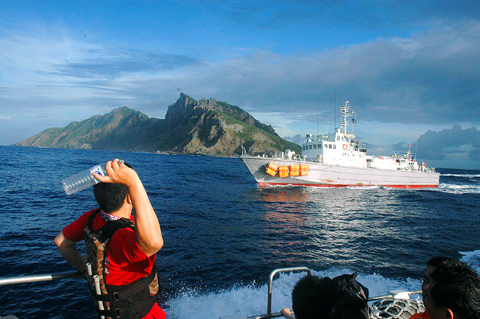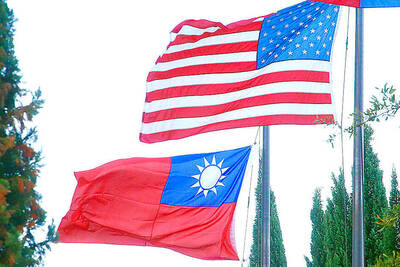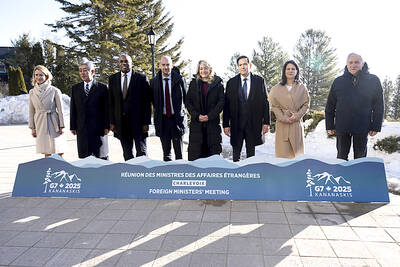Representative to Japan Koh Se-kai (許世楷) submitted his resignation yesterday after he was accused by Chinese Nationalist Party (KMT) lawmakers of being a “traitor” for “siding with the Japanese.”
As of press time, the Ministry of Foreign Affairs had not accepted the resignation and had instead lauded Koh’s contribution and hard work in solidifying bilateral relations.
“A solider can be killed, but must not be insulted. I absolutely cannot accept the accusations that have been leveled at me,” said the 74-year-old diplomat, who is highly respected in Japan.

PHOTO: CNA
Koh refused to show up at the legislature yesterday afternoon as scheduled “because they [pan-blue lawmakers] would only pepper me with insults instead of letting me explain the details of the incident.”
Koh said he had planned to submit his resignation after the transfer of power on May 20, but the ministry had been reluctant to accept it, especially in the wake of the high-seas collision off the Diaoyutai (釣魚台) islands a week ago that led to the sinking of a Taiwanese fishing boat.
The ministry recalled Koh in protest against the Japanese authorities’ claims that the accident resulted from a bungled attempt by the Japanese patrol vessel to chase the fishing boat away from Japan’s territorial waters and that the Taiwanese vessel was partly to blame for the incident.
Koh said he had originally agreed to stay on until the incident blew over, but said “the caustic affront by the pan-blue camp has prompted me to seek immediate relief from my duty.”
In a press release, the ministry said Koh’s refusal to show up at the legislature for an interpellation session was “very inappropriate” because he was still the representative to Japan and has the responsibility to report to the legislature even though he has submitted his resignation.
The ministry also said Koh’s request to leave his position by the end of next month must be approved by the president because the post he occupies is that of a presidentially appointed special envoy. The ministry said it would respect Koh’s wishes by submitting his resignation to the Presidential Office.
Koh, a staunch supporter of Taiwanese independence, also said he would not consider giving up his permanent residency in Japan because he plans to retire soon.
He said holding residency in a foreign country does not violate any law.
Koh said he obtained Japanese residency more than three decades ago when he was in political exile after the then-KMT government placed him on a blacklist.
“I couldn’t come back to Taiwan. When my Republic of China [ROC] passport expired Japan offered me two choices — to become a naturalized citizen or a permanent resident. I chose the latter,” he said.
Meanwhile, KMT caucus whip Lin Yi-shih (林益世) lashed out at Koh for not announcing his resignation at the legislature, saying that he treated his resignation as “child’s play.”
KMT Legislator Lu Hsueh-chang (呂學樟) said Koh’s insistence on retaining his Japanese residency had prompted suspicions about his loyalty.
In related news, KMT Legislator Lin Yu-fang (林郁方) said the legislature’s Diplomacy and National Defense Committee should still make an inspection trip of the area around the Diaoyutais tomorrow. He said the nation needed to take a hardline stance on the Diaoyutai issue before continuing negotiations with Tokyo.
“This is exactly what [President] Ma [Ying-jeou (馬英九)] said by ‘keeping it alive.’ We have to keep the issue in the spotlight. Tokyo will talk to us nicely when it can’t handle it anymore,” Lin said.
But KMT caucus deputy secretary-general Wu Yu-sheng (吳育昇) said there was no need for the committee members to take the trip and such an expedition could raise tensions with Japan.
“We should decide our next step after careful consideration,” he said.
A group of activists, escorted by Coast Guard Administration (CGA) vessels, sailed around the Diaoyutais yesterday morning to highlight Taiwan’s claim to the islands.
CGA official Huang Han-sung (黃漢松) told a press conference that the coast guard had dispatched four large patrol vessels and five patrol cutters to guard the activists’ boat.
The 12 activists sailed from Shenao, Taipei County, at midnight on Sunday, accompanied by about 30 reporters.
Huang said the boat sailed within 12 nautical miles (22km) of the Diaoyutais at 4:55am. When the boat was within six nautical miles of the islands at 5:25am, two Japanese patrolboats started to block the vessel. One Japanese boat started spraying water at the Taiwanese boat, while another created waves to halt the boat’s progress, Huang said.
He said the Taiwanese boat and its coast guard escort continued to press forward until 5:44am when the activists’ vessel was within 0.4 nautical miles of the islands, as the Japanese ships used ropes to halt the boat.
Huang said the five CGA cutters accompanied the boat as it circled the Diaoyutais before starting the trip back to Taiwan at 6:23am. He said the expedition had been peaceful, but tense.
Deputy Coast Guard Administration Minister Cheng Chang-hsiung (鄭樟雄) said a coast guard vessel tried to communicate with the Japanese Maritime Safety Agency authorities to tell them that the Taiwanese convoy’s sail around the disputed island group was aimed at “protecting the territorial waters of the Republic of China,” but the Japanese did not respond.
In related news, Koh yesterday reiterated that he believed Tokyo has already apologized for last week’s incident by expressing “regret” and that the Japanese government hopes the incident will not damage bilateral relations.
Koh said he had met with several high-ranking Japanese officials following the incident, including a former prime minister, all of whom expressed a desire to minimize the incident to protect bilateral ties.
“The government must be rational in dealing with this issue. Of course the Diaoyutais are part of our territory, but we must exhaust all diplomatic means and calculate each step carefully before we even speak of war,” the envoy told a press conference.
Koh said that in Japanese diplomatic custom the word “regret” carries the same meaning as an “apology.” The headline of one Japanese newspaper, he said, even used “admits its wrongdoing” to describe the Japanese attitude toward the accident.
Koichi Ito , director of the General Affairs Department under the Taipei Office of the Interchange Association--- the de-facto Japanese embassy in Taipei--- and a Japanese coast guard official, on separate occasions over the last two days, have said the Japanese government hopes the incident will not damage bilateral relations and that the incident was “deeply regrettable.”
Ito said the Japanese patrol boat Koshiki did not ram the fishing boat on purpose, as the boat’s captain has claimed.
Although the Japanese government has agreed to pay compensation, the boat’s captain, Ho Hung-yi (何鴻義), has been charged with “negligence due to incurring danger during official business.”
The incident, and what has been seen as Tokyo’s refusal to give a formal apology, has sparked outrage in Taiwan.
This has included an online petition that calls for a boycott of all Japanese-made goods.
Meanwhile, Democratic Progressive Party (DPP) spokesman Cheng Wen-tsang (鄭文燦) criticized the Ma administration yesterday over its handling of the dispute, saying the government lacked maturity and consistency.
Cheng quoted DPP Chairwoman Tsai Ing-wen (蔡英文) as saying that the administration was slow to respond to the situation and has been inconsistent in handling the affair, which created the impression that it was immature in dealing with foreign affairs and did not know how to run the country.
Cheng, however, praised Koh’s performance, saying the envoy has done a good job negotiating with Tokyo.
The DPP was sorry to see the administration use this incident to humiliate him, Cheng said. He said the DPP supported Koh’s decision to resign.
ADDITIONAL REPORTING BY RICH CHANG, KO SHU-LING AND CNA

NATIONAL SECURITY: The Chinese influencer shared multiple videos on social media in which she claimed Taiwan is a part of China and supported its annexation Freedom of speech does not allow comments by Chinese residents in Taiwan that compromise national security or social stability, the nation’s top officials said yesterday, after the National Immigration Agency (NIA) revoked the residency permit of a Chinese influencer who published videos advocating China annexing Taiwan by force. Taiwan welcomes all foreigners to settle here and make families so long as they “love the land and people of Taiwan,” Premier Cho Jung-tai (卓榮泰) told lawmakers during a plenary session at the Legislative Yuan in Taipei. The public power of the government must be asserted when necessary and the Ministry of

Taiwan’s Lee Chia-hao (李佳豪) on Sunday won a silver medal at the All England Open Badminton Championships in Birmingham, England, a career best. Lee, 25, took silver in the final of the men’s singles against world No. 1 Shi Yuqi (石宇奇) of China, who won 21-17, 21-19 in a tough match that lasted 51 minutes. After the match, the Taiwanese player, who ranks No. 22 in the world, said it felt unreal to be challenging an opponent of Shi’s caliber. “I had to be in peak form, and constantly switch my rhythm and tactics in order to score points effectively,” he said. Lee got

EMBRACING TAIWAN: US lawmakers have introduced an act aiming to replace the use of ‘Chinese Taipei’ with ‘Taiwan’ across all Washington’s federal agencies A group of US House of Representatives lawmakers has introduced legislation to replace the term “Chinese Taipei” with “Taiwan” across all federal agencies. US Representative Byron Donalds announced the introduction of the “America supports Taiwan act,” which would mandate federal agencies adopt “Taiwan” in place of “Chinese Taipei,” a news release on his page on the US House of Representatives’ Web site said. US representatives Mike Collins, Barry Moore and Tom Tiffany are cosponsors of the legislation, US political newspaper The Hill reported yesterday. “The legislation is a push to normalize the position of Taiwan as an autonomous country, although the official US

CHANGE OF TONE: G7 foreign ministers dropped past reassurances that there is no change in the position of the G7 members on Taiwan, including ‘one China’ policies G7 foreign ministers on Friday took a tough stance on China, stepping up their language on Taiwan and omitting some conciliatory references from past statements, including to “one China” policies. A statement by ministers meeting in Canada mirrored last month’s Japan-US statement in condemning “coercion” toward Taiwan. Compared with a G7 foreign ministers’ statement in November last year, the statement added members’ concerns over China’s nuclear buildup, although it omitted references to their concerns about Beijing’s human rights abuses in Xinjiang, Tibet and Hong Kong. Also missing were references stressing the desire for “constructive and stable relations with China” and